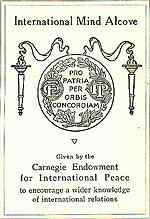
Protesters in front of former Chicago Public Library and Grand Army of the Republic Hall, Chicago, Illinois, November 11, 2016
Regardless of political affiliation, the recent elections in the United States have left many educators and librarians wondering how to make sense of what appears to be a dramatic political shift that impacts both our ideas of knowledge and notions of tolerance, multiculturalism, and global perspectives. This is not the first time we’ve experienced this kind of societal challenge, and a historical perspective may provide guidance regarding the challenges educators, librarians, and funding agencies that focus on fostering global and intercultural perspectives may face.
In a recent op-ed piece, Benjamin Soskis, historian of philanthropy at the Center for Nonprofit Management, Philanthropy and Policy at George Mason University, addresses how philanthropists and foundations might need to adjust to changes in the political landscape and respond to apparent lapses in support for both rural populations and others disconnected from the global economy[i]. Soskis’ analysis pointedly looks back to the challenges and activities of 20th Century philanthropy programs that broadly addressed educational issues in the US. Soskis also alludes to the need to support dialogue and understanding that counters worldviews focused narrowly on ethnic nationalism and skepticism of international entanglements.
Soskis’ look back at the 20th Century is prescient in the observation of a focus on the educational needs of rural Americans but also in pointing to political parallels to what the United States and world may be facing. Edward Kolodziej, Emeritus Professor of Political Science at the University of Illinois, recently noted in a lecture on global governance that global politics may be moving back to a model last seen in the 1920’s.[ii]
How did some educators and librarians address these problems during this era?

Bookplate from International Mind Alcove program.
In 1918, the Carnegie Endowment for International Peace (CEIP) partnered with educators and libraries to promote what we would now consider global perspectives and intercultural understanding. Through what were called International Mind Alcoves the CEIP freely distributed books aimed to encourage cosmopolitan thinking across the globe in order to foster the social and economic conditions for peace.[iii] During the program’s 40 year history, the alcoves grew from a group of small, informal, book collections to a well-funded and highly organized operation. These books were used to promote learning about international relations and cultures and to influence people to realize their “duties, rights, and obligations” as humans within an international system.[iv] Beginning in 1918 and ending in 1948, the International Mind Alcove program established 1,120 adult collections and 447 juvenile collections in mainly rural US public libraries, plus additional collections throughout Europe, Latin America, the Near East, and Asia.
The notion of the “International Mind” was promoted heavily by the CEIP’s chairman of the Division of Intercourse and Education, Nicholas Murray Butler. The overall aim of this work was to replace nationalism with internationalism by nurturing perspectives that transcended political boundaries. This type of advocacy falls within Akira Iriye’s definition of cultural internationalism and the “variety of activities undertaken to link countries and people through the exchange of ideas and persons, through scholarly cooperation, or through efforts at facilitating cross-national understanding”.[v] Central to cultural internationalism is the idea that the key to a sustained peace is cross-cultural knowledge engendered by education and exchange. In the early and mid 20th Century, this new form of internationalism focused on the growing sense of a “global community in which all nations and people shared certain interests and commitments”.[vi]
The International Mind Alcove program’s history reveals an often complicated and controversial relationship between the State, education movements, society, and funding agencies. Just as current debates focus on the authority of knowledge and the confusing distribution of propaganda and false news through social networking platforms, early and mid 20th Century information dissemination generated debate about the value and power of knowledge in the public sphere. These debates often played out in public libraries around the selection of books. For example, in Harlingen, Texas, it was reported that the Public Library board debated the need for “more books on Americanism” as a way to “combat the spread of communism” in an article that also noted “an interesting report on the popularity of the International Mind Alcove collection”.[vii]
The role of knowledge and media in the juxtaposition of Americanism and internationalism also featured heavily on Capitol Hill. In a series of Congressional speeches Massachusetts Representative George Tinkham, who was skeptical of internationalism, warned that “the manipulation of public opinion from sources which do not represent the general public will become the poisoned cup from which the American Republic will perish.” Tinkham called for “a congressional investigation of the propaganda methods of the CIEP and its allies [to] . . . insure preservation of American independence and American neutrality”.[viii] By the early 1950’s, these educational programs were again under fire. Through House Resolution 561, the 82nd US Congress investigated whether or not tax-exempt foundations were misusing their funds to support activities that countered national interests. The committees were charged with conducting a “full and complete investigation and study of educational and philanthropic foundations and other comparable organizations which are exempt from Federal income taxation to determine if any foundations and organizations are using their resources for purposes other than the purposes for which they were established, and especially to determine which such foundations and organizations are using their resources for un-American and subversive activities; for political purposes; propaganda or attempts to influence legislation”.[ix] The Chicago Daily Tribune, which had long been critical of internationalist programs, editorialized that “huge foundations in the country have been diverted into propaganda for globalism”.[x] On the other hand, the New York Times, editorialized on the “dangers to freedom of scholarship, research and thought that lie half-hidden between the lines” of the committee’s investigation.[xi]
There is a clear historical connection between the continued debate between worldviews and the pendulum may be swinging once again toward ethnic nationalism and isolationism. It is also apparent that educators and librarians continue to play a key role in helping communities navigate differences in worldviews amidst a media environment that inspires distrust in knowledge and the existence of multitruths. What lies ahead is unknown. It is clear, however, that our work to provide opportunities for cultural engagement and to promote a critical understanding of the media and knowledge production are as important now as a century ago.
[i] Opinion: New Realities for Philanthropy in the Trump Era. (2016, November 10). Retrieved November 18, 2016, from https://www.philanthropy.com/article/Opinion-New-Realities-for/238379/
[ii] See: Kolodziej, E. A. (2016). Governing globalization : Challenges for democracy and global society. London: Rowman & Littlefield International.
[iii] See: W, W. S. (2014). International Mind Alcoves: The Carnegie Endowment for International Peace, Libraries, and the Struggle for Global Public Opinion, 1917–54. Library & Information History, 30(4), 273–290. https://doi.org/10.1179/1758348914Z.00000000068
[iv] Butler, N. (1923). ‘The Development of the International Mind.’ Advocate for Peace, 85 (1923), p. 344–45.
[v] Iriye, A. Cultural Internationalism and World Order. (Baltimore: Johns Hopkins University Press, 1997), p. 3.
[vi] Iriye, A. Global Community: The Role of International Organizations in the Making of the Contemporary World. (Berkeley: University of California Press, 2002), p. 18.
[vii] ‘Rotarians make gift to library.’ Heraldo de Brownsville. October 16, 1938, p. 5.
[viii] Tinkham, G. H. (1933). ‘Nicholas Murray Butler’s Attitude ‘Seditious’. Milwaukee Sentinel, February 26, 1933.
[ix] US Congress. House. Special Committee to Investigate Tax-Exempt Foundations. Tax-exempt Foundations: Hearings before the Special Committee to Investigate Tax-Exempt Foundations and Comparable Organizations. 83rd Congress. (US Government Printing Office, 1954), p. 1.
[x] Fulton, W. 1951. ‘Foundations Wander into Fields of Isms: Divert High Aims; Probe Planned Diverted to Globalistic and Red Propaganda.’ Chicago Daily Tribune, October 15, 1951, p. 1.
[xi] ‘Foundation Inquiry.’ New York Times, December 11, 1952.



